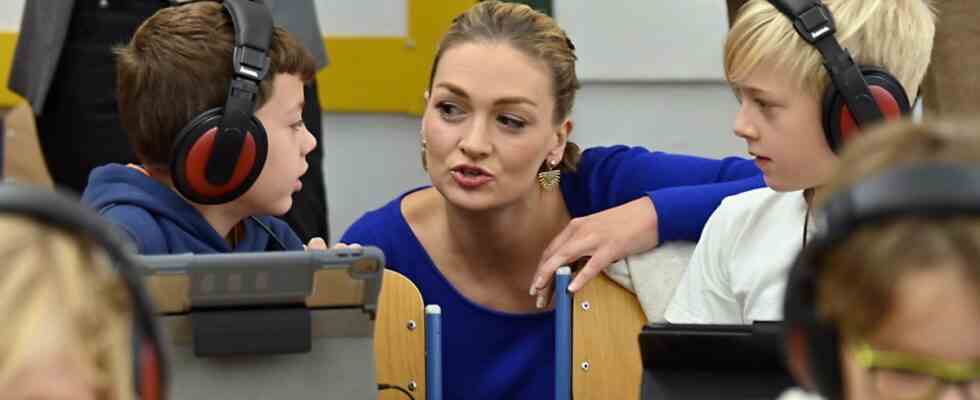“Have you ever seen such a quiet class?” Asks the mayor of Oberhaching, Stefan Schelle (CSU). The 4a students wear headphones and type on tablets to solve memory or multiplication problems. These are in the “Where’s Goldi?” app. embedded in a larger story designed to educate children about the dangers of the Internet. “Who found the goldfish?” Asks Digital Minister Judith Gerlach (CSU), whereupon all the students raise their hands. “Our lives are becoming more and more digital, and that of our children even more so,” says the class minister.
When playing, the elementary school students adopt an avatar from whose point of view they reenact everyday school life. They have to help their classmates to find secure passwords and recognize phishing emails or fake news. “We want you to have fun playing, but we also want to show that, in addition to funny videos on the Internet, there are also people who don’t mean well,” she tells the children. Meanwhile, 4a is working on two new puzzles that were released this week. “Wiebke is chatting with a boy who isn’t really who he claims to be,” says ten-year-old Leni, who plays the chapter on “cybergrooming”. This refers to the targeted manipulation of mostly underage victims, in which the perpetrators become sexually assaultive, for example by demanding naked pictures or asking intimate questions. “Maybe the twelve-year-old Lena I’m chatting with is actually the 56-year-old Karl-Heinz,” says the minister. In the app, this danger is demonstrated in a way that is child-friendly, with Wiebke being pelted with paint bombs by her internet acquaintance when she meets her for the first time.
Tablets and laptops in the classroom
“The children in our heterogeneous class really took to the app,” says class teacher Stefanie Schipfer. After the game, they discuss each chapter and repeat the main statements together with the children, says Schipfer. For the fourth graders at the Oberhaching primary school, the digital goldfish search is part of the “media driver’s license”, which certifies that they use the Internet responsibly. In order to introduce the children to the reality of life in the digital world at an early stage, there are tablets and laptops in all classes that the children can use for their research while following the rules, says Claudia Besson, headmaster of the primary school.
As the children sit in front of the screen, the classroom is completely silent.
(Photo: Claus Schunk)
“Corona has had a positive effect on digitization in schools,” says Mayor Schelle, “here the iPad is used as a modern teaching tool.” Laura got her first cell phone at the age of four. “I used it for taking photos and listening to music,” says the fourth-grader. Two years ago she needed a smartphone for online lessons, but she is not yet allowed to chat with it. Very few of her students have ever experienced a personal confrontation with the issues, says the class teacher. That’s why it’s important to sensitize children to the dangers of the Internet early on, before problems such as cyberbullying arise. “This will be an issue, especially in secondary schools,” says Schipfer.
The ministry’s app, which was released at the beginning of the year, has already received several national and international awards. “Where’s Goldi?” also has a parents’ area where mothers and fathers can find out about media skills. “Once you’ve played through the game, you’re really well prepared,” the minister tells the students. Then they could show their parents everything they knew. “It is important that the parents signal to their child that they can come to them with any questions relating to the Internet,” says Gerlach.

